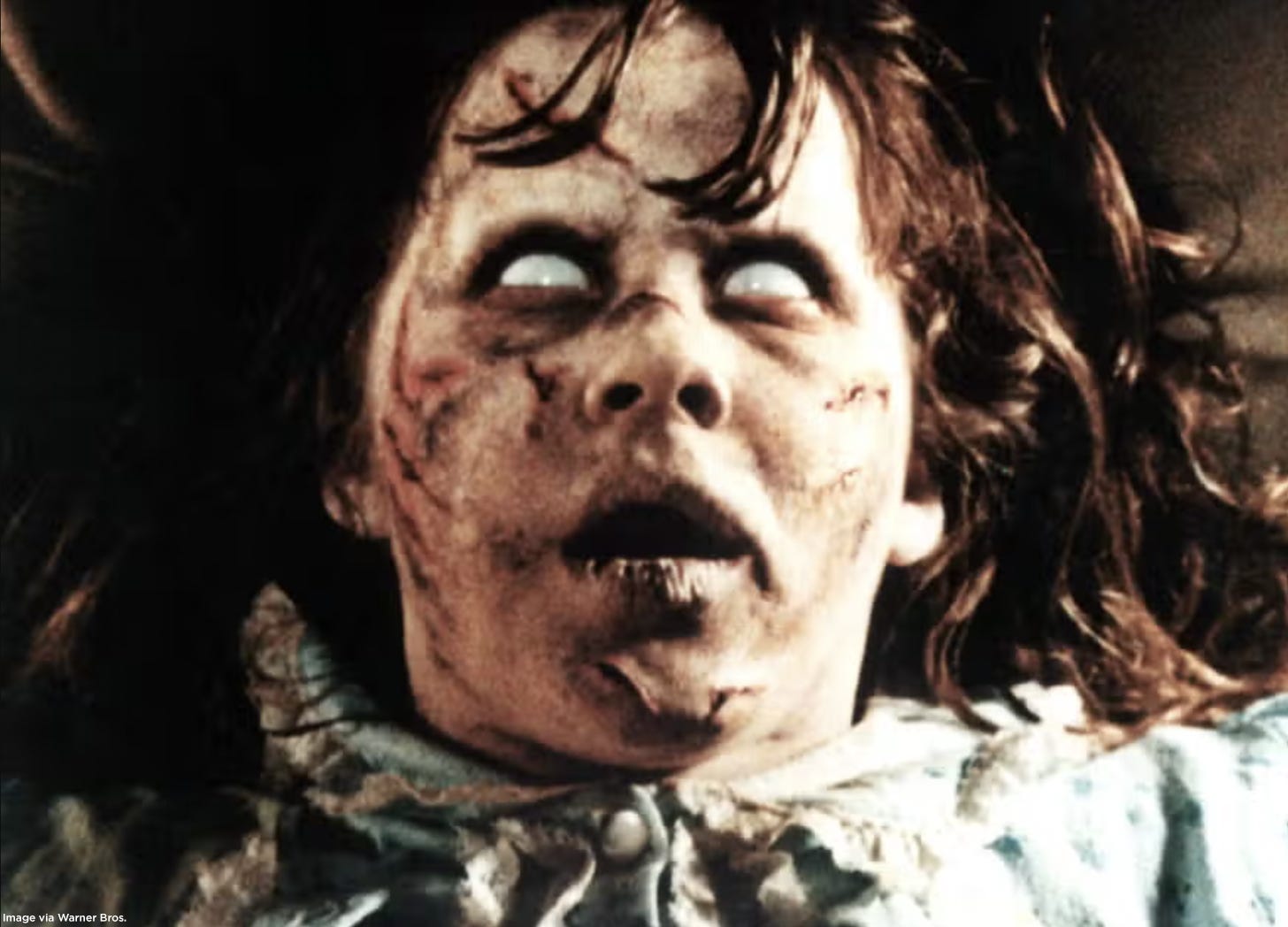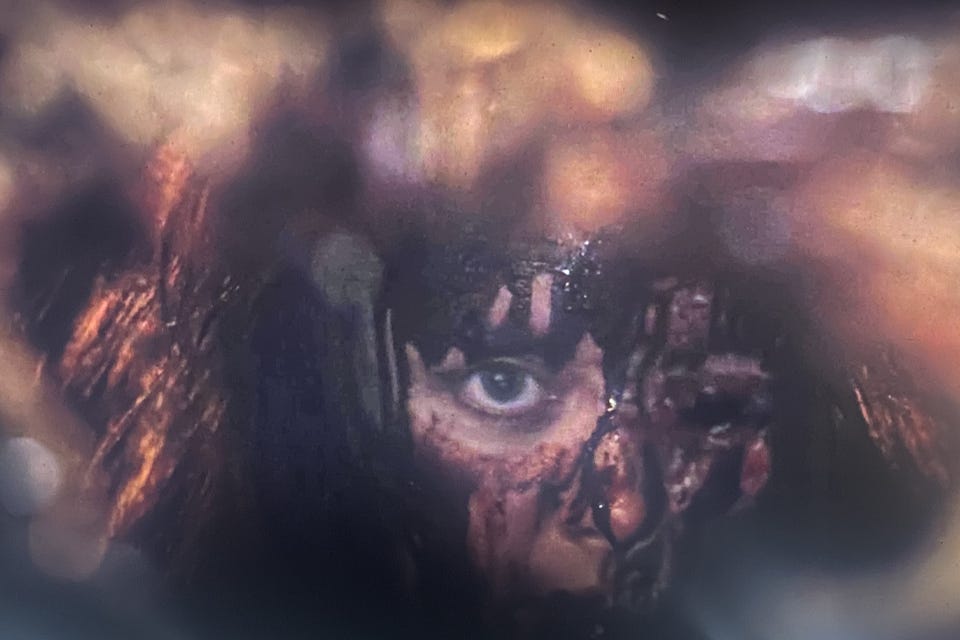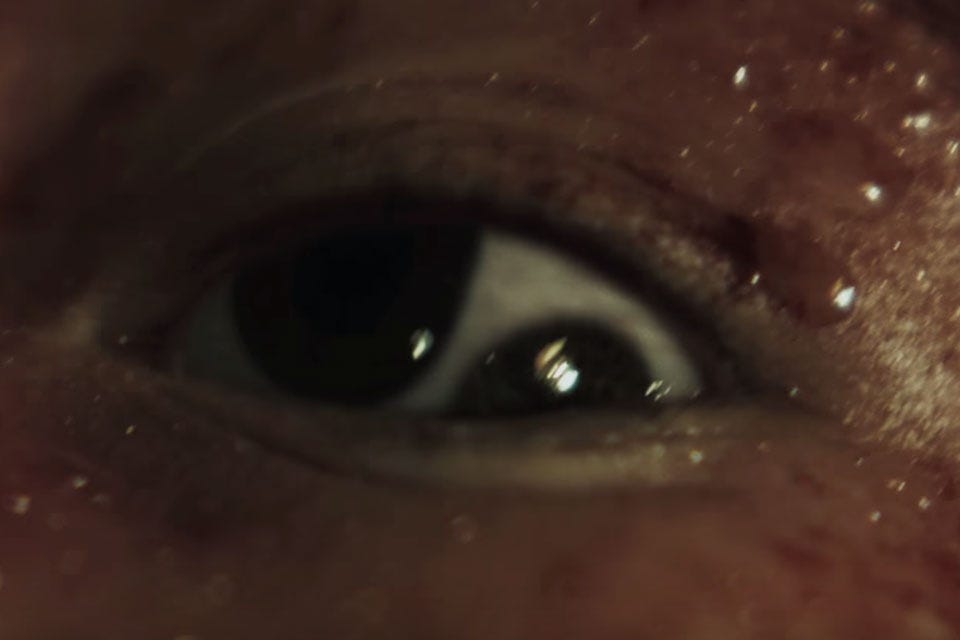'The Exorcist' Already Has a Perfect Sequel
But it was never released in theaters...
People have been trying, and failing, to make a good sequel to The Exorcist for almost as long as The Exorcist has existed. William Peter Blatty’s original novel was released in 1971; two years later, Blatty adapted the novel for director William Friedkin, resulting in an acclaimed mega-hit that remains one of the most imitated movies ever made and arguably the best horror film ever produced. Entire books have been written about what makes The Exorcist so great, but I think the simplest explanation is that it’s terrifying on multiple levels: It exploits fears about not being able to help our loved ones, fears about the loss of innocence, fears about the damage that can be done to our bodies, and fears about all the things we can never know for certain (imagine how you’d feel if you found out that God and Satan are both very real!).
The original film’s success inevitably lead to director John Boorman’s 1977 sequel, The Exorcist II: The Heretic, a notoriously awful movie. In 1983, Blatty released a new novel, Legion, based on abandoned plans for a Friedkin-helmed sequel; it was eventually adapted into The Exorcist III, with Blatty himself directing, and while there are certainly interesting elements in that film (including excellent performances by George C. Scott and Brad Dourif), even Blatty was reportedly unhappy with studio-mandated changes.
Then, in the early aughts, Friedkin’s peer, Paul Schrader, was hired to direct a prequel movie, which was ultimately released, in 2005, as Dominion: Prequel to the Exorcist… but before that, Schrader was fired, the entire movie was completely reshot with lead but Cliffhanger director Renny Harlin at the helm and released as Exorcist: The Beginning in 2004. Unfortunately, the behind-the-scenes drama is more interesting than either of the resulting films.
David Gordon Green is the latest director to take a run at it with The Exorcist: Believer, which comes out today. Green appears to be utilizing the same tactics that made his 2018 Halloween reboot a box office success: He’s bringing back the original star (in this case, Ellen Burstyn) and ignoring all the other sequels, lest he be beholden to canon.
We’ll find out if Green succeeded where so many others have failed soon enough. But while we wait, I’d like to point out that there actually has been a great sequel to Friedkin’s original movie: The short-lived television series, which aired on Fox in 2016 and 2017.
Created by Jeremy Slater - who went on to oversee Marvel’s excellent Moon Knight series on Disney+ - each of The Exorcist’s two ten-episode seasons follows a pair of priests, Father Tomas Ortega (Alfonso Herrera, Ozark) and Father Marcus Keane (Ben Daniels, The Crown), as they combat a different possession. To say anything more than that would be to spoil some of the stories’ most fun revelations, but suffice it to say, the show gradually reveals that it takes place within the continuity of the ‘73 film. And it’s friggin’ terrific.
What makes it so good? As is the case with all serialized storytelling, the characters are the key to its success. Ortega, Keane, and the supporting ensemble contain multitudes. Slater understood that for an exorcism story to work, the demons with which the heroes wrestle must be metaphysical as well as literal… but he also understood that the world is a very different place in the 21st century than it was in the early ‘70s. At that point in history, following a decade of unjust war and political assassinations, mainstream America was only just starting to wrestle with the fact that maybe they didn’t live in the City upon a Hill they believed the country to be. So in the original story, Father Karras (Jason Miller) suffers a crisis of faith simply because he can’t comprehend why God would allow a world so full of evil. But that’s too simplistic a concept five decades later, when we’ve come to accept that our society is corrupt and that politics exist in an ethical gray zone; hand-wringing over how God could allow for war and disease and starving children feels naive.
So the moral struggles of the priests on The Exorcist series are far more complicated. Ortega struggles with ongoing feelings for a now-married woman with whom he was romantically involved before taking his vows, and she continues to make it clear that she’d still sleep with him at the drop of a hat, which, y’know, doesn’t make it any easier on him. Keane, meanwhile, is a hardened cynic to the nth degree, having witnessed his mother’s murder at the hands of his father when he was just a boy. Consequently, he has little regard for Church rules and regulations, and has become a “Means justify the ends” kinda guy, even if he is devoutly Catholic: Faced with the possibility of an exorcism being disrupted, he opts to threaten a fellow priest with a gun. These are not your run-of-the-mill good Catholic boys.
The afflicted and their families are similarly complex, even before they’re possessed. The result is that you become invested in the characters’ personal dramas. In fact, the series excels at making the audience complicit in moral ambiguity; watching a possessed girl brutally disfigure a would-be rapist is as cathartic as it is unsettling, forcing the viewer to rethink their very notions of what is “good” or “bad.” The show does this so well, it fact, that might very well have been just as satisfying even without the supernatural elements.
(Naturally, it doesn’t hurt that the entire cast is crazy-good; supporting players include Succession’s Alan Ruck, Star Trek’s John Cho, Cagney & Lacey’s Sharon Gless, August: Osage County’s Deanna Dunagan, Orange is the New Black’s Alicia Witt, Yellowjackets’ Sophie Thatcher, Brianna Hildebrand from the Deadpool movies, and Oscar winner Geena Davis, who, coincidentally, used to be married to Exorcist: The Beginning director Renny Harlin. Other, lesser-known cast members, including Kirsten Fitzgerald, Robert Emmet Lunney, Francis Guinan, and Kurt Egyiawan, also hit the ball out of the park.)
The series DOES have supernatural elements, of course, and it succeeds in that regard, too. Some of what it does feels fresh: It expands on the multi-tier anxieties that Friedkin exploited to include not just the corporeal and ontological but the explicitly political as well, drawing dread from tensions between races and classes and capitalizing on our suspicions that the institutions meant to protect us may, in fact, be out to destroy us. And instead of just making allusions to “imaginary friends” like Captain Howdy, we get to see what it’s like, subjectively, to be the possessed, and to have visions of a seductive “ally” who is anything but (which also allows it to be a story about the power dynamics between different genders and generations as much as it about anything else; the way it portrays the relationship between sexual predator and sexual prey feels uncomfortably real despite the predator being a malignant spirit).
But even when the show is just recycling tropes we’ve seen before, it executes those tropes so well it doesn’t matter that they’re not new; it’s creepy and gross and disturbing and often bleakly droll (when Keane holds up a crucifix and shouts “The power of Christ compels you!”, his demonic adversary replies, “Do I look compelled?”). Sometimes its special effects betray its budgetary limitations, but it’s not a big deal, because it’s all so engaging. It also really expands the scope of the movies by introducing the idea that much as God has his soldiers on Earth, so does Satan - which not only allows for some genuinely scary moments, but also puts our heroes in even more of an underdog position, thus making their inevitable victory all the more gratifying.
Furthermore, in this day and age of reboots and sequels that are endlessly bogged down in recycled imagery… er, “homages” to their predecessors, The Exorcist series does a crackerjack job of invoking Friedkin’s original film (a possessed girl publicly wetting herself, spinning heads, crab-walking/contortionism, a silhouette of a fedora-wearing priest approaching a house, fleeting use of Mike Oldfield’s “Tubular Bells,” etc.) while forging its own identity. For example, eyes have always been an important recurring image in this franchise - but the series evolves that imagery and makes it its own, both with its depiction of polycoria and an array of menacing shots depicting a single eye peeking through a hole.
And not for nuthin’, but the show’s theme, composed by Daniel Hart, is also pretty great [Note: The video below incorrectly attributes the theme to Tyler Bates, who scored some of the series’ second season].
Is The Exorcist series as good as the ‘73 film? Of course not; the chances of topping anyone ever topping that movie are roughly the same as the chances that you’ll win the lottery, be struck by lightening, and find out your daughter has been possessed by Pazuzu all on the same day. But it is a worthy successor to Friedkin and Blatty’s original achievement… to say nothing of the fact that it’s better than 99% of all other Exorcist-inspired films and television shows. That it wasn’t more commercially successful is surely the work of Satan himself.







